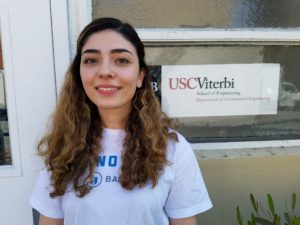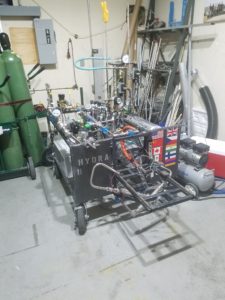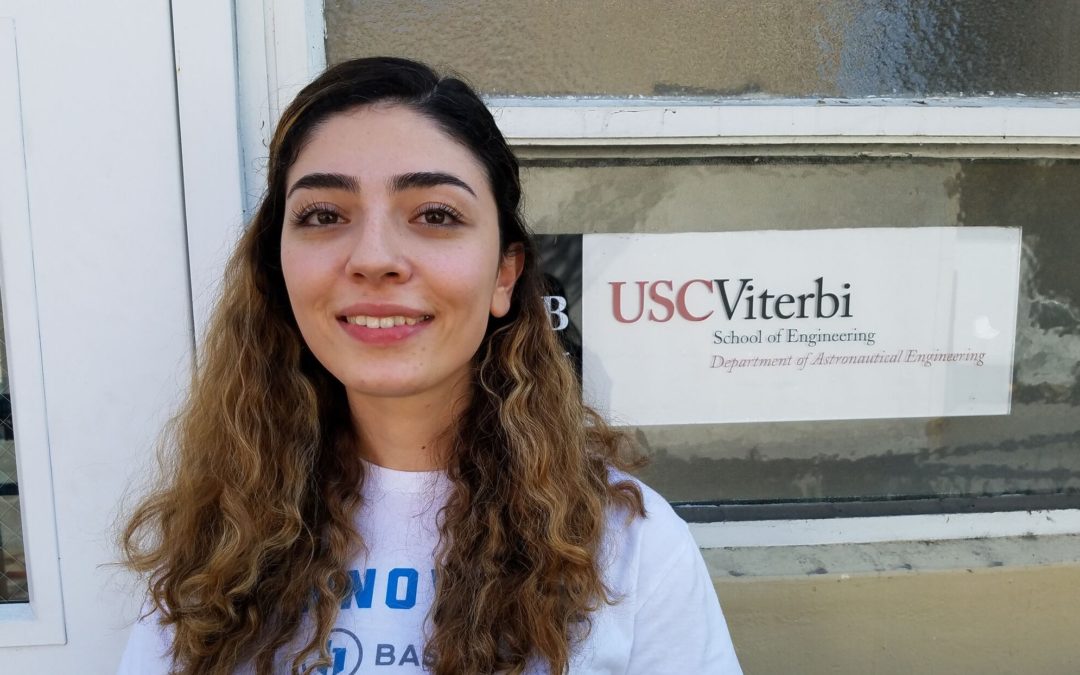By Jade Kim, Administrative and Operations Coordinator
From having never stepped foot in a rocketry lab to becoming an integral part of a prestigious rocketry team, Base 11 Victory Circle student Serli Alexandi is an exceptional example of what can happen when STEM talent meets real-world experience and mentorship.
Serli was recently accepted into USC after participating in the Liquid Propulsion Lab academic year-round internship where she got to work alongside other students and faculty and learn all about the ins and outs of rocketry. We sat down with Serli to hear more about her experience.

Serli Alexandi standing in front of the USC Liquid Propulsion Lab
How were you first exposed to rocketry?
I was first exposed through the USC Liquid Propulsion Lab internship.
What inspired you to apply for the Base 11 USC program?
Reading success stories of people like me on Base 11 website, and encouragement from my friends and professors at Glendale Community College.
What were some of the biggest challenges in working at the LPL?
The big learning curve, especially in the beginning, was the biggest challenge. I got into the program with huge excitement, but zero background about rockets. However, my mentors’ guidance and encouragement led me to learn quickly and keep up with the projects and workload.
What were some of your biggest accomplishments in the LPL?
One of my biggest accomplishments was to learn how to be a team player, that things happen and all you have to do is to improve, try again, and move forward. I’ve built invaluable friendships, learned to believe in myself, and to be confident.
And of course, in terms of academics, the amount of knowledge I obtained during the program is equivalent to years of work experience, and classroom lectures, which I value so much and grateful for.
Did participating in the Base 11 program helped you get accepted to USC?
I definitely think that it did play a role because I had already built a connection with USC and was involved in one of their student associations.

Hydra, the test stand and feed system that Serli helped work on
Can you give us a brief summary/overview of what your project was with LPL?
One of the big projects that I had was modeling one of the rocket engine’s feed system in a computer software. The other big hands-on project was the building of the oxygen manifold, which connects the eight oxygen tanks to each other which in turn gets connected to the feed system. My last big project was the test and operation of water flow test stand (different components of liquid rocket engine can be tested for performance, independently, on this test stand).
What are your plans for continuing to work with LPL as an undergrad (e.g., what part will you play on the team)?
I will continue to test and operate the water flow test stand and learn more about its data processing. Currently, I’m the assistant test engineer for Balerion engine’s injector test.
What it was like being one of the few/only women in the LPL program?
It was definitely another challenge, but since everyone in the lab was so respectful and friendly, I always felt safe and welcomed.
What was most beneficial or impactful about the mentorship you received from the graduate students?
Definitely, the most beneficial thing was to see how passionate they were about what they do and how serious they take it. They mentored me the same way. Each week they exposed me to a different level of knowledge, made sure I understood it, and demanded a project like it in the upcoming week. This experience prepared me very well for any future internship that I’m going to have in the industry. The reason is now I know what to expect, I have learned how sometimes the decisions need to be made quickly and reliably, how to-do lists need to be made so that the deadlines can be met.
What are your dreams for your future career?
My dream is to become NASA engineer. I don’t have any specific job function in mind currently, but I would like to work in propulsion or control systems.
What advice do you have for students looking to pursue the field of rocketry? Particularly female students.
To not to be afraid of applying for different opportunities like Base 11 internships, spreading their wings, and taking advantage of all the opportunities that come their way. You will never know what each experience can bring. Even during the experiences which are not great, one can still learn and take a great lesson for future endeavors. I have always had a passion for space and everything associated with it, but studying rocket science was not in my plans.
Interning at LPL and being exposed to graduate level projects, real engineering problem solving, and working with rocket engines made me fall in love with it, to the point that I decided to continue to graduate school at USC and study astronautical engineering after obtaining my bachelor’s in mechanical engineering.

Serli standing proudly with her fellow USC LPL interns
To learn more about Base 11 programs, click here.

